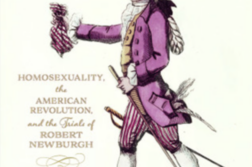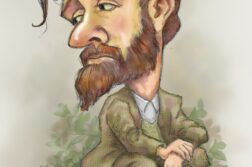DUTCH POET and novelist Jacob Israël de Haan was born in Smilde, the Netherlands, on December 31, 1881, and murdered in Jerusalem on June 30, 1924. As a writer, he is perhaps best known for his first novel Pijpelijntjes, which appeared in 1904 and caused a considerable uproar on account of its explicit description of a homosexual relationship, the first such description in Dutch literature. Pijpelijntjes has been translated into several languages, but sadly English is not one of them. De Haan dedicated the first edition to a certain A. Alterino, who reacted negatively to the tribute, purchased every available copy, and had them all destroyed. A reprint in the same year endeavored to disguise references to actual figures in de Haan’s life, but the book’s autobiographical character could not be concealed. For some readers, the book was simply decadent, and it ultimately cost de Haan his job.
What’s remarkable about de Haan is that his principal life’s work was not as a writer but as a Jewish diplomat and a political organizer. The son of a synagogue official (and one of eighteen children), he developed an interest in Zionism as a youth and spent much of his short life organizing on behalf of an Orthodox sect, the Haredim, in Jerusalem. Elected to the post of political secretary of the Orthodox community council, de Haan was charged with negotiating with non-Orthodox Jewish groups and with Arab leaders, with whom he favored a diplomatic settlement as an alternative to warfare. His assassination in Jerusalem in 1924 was at the behest of the secular Zionist establishment, ostensibly because it disapproved of de Haan’s political agenda, which included negotiations with the Hashemite leader for the official creation of both a Jewish state and a Palestinian state in the Levant.
More recently, the argument has been advanced that a contributing factor in de Haan’s murder may have been his homosexuality, which appears to have been an open secret during his years in Israel. For all his adherence to an Orthodox brand of Judaism, de Haan continued to have sex with males, mostly Arab youths from East Jerusalem. These relations he immortalized in a book of poems called Quatrains, which was published in the Netherlands in the same year as his death. Whether a factor in his murder or not, de Haan’s homosexuality, and his openness about it in his writings, has made him something of a martyr in the Dutch gay community of today. At the same time, the discovery of his gay writings has diminished somewhat his martyrdom in the eyes of the Orthodox Jewish community, which nevertheless continues to revere de Haan as a warrior against secular Zionism.
In addition to his novels, de Haan wrote and published a considerable number of poems, many of which contained expressions of his homoerotic feelings. The three poems translated here are taken from his collected Liederen or Songs (K. Lekkerkerker, editor, Jacob Israel De Haan, Verzamelde Gedichten Vols I & II, Van Oorschot: Amsterdam, 1952). “To a Young Fisherman” was first published in Het Jaar der Dichters in 1913, “To a Friend” in De Beweging in 1916, and “The Young Shepherd” in Groot Nederland in 1910. He dedicated a number of poems to Oscar Wilde in commemoration of his imprisonment in Reading Gaol in the 1890’s. The fourth line of To a Young Fisherman—“Such a boundless hankering for friendship”—is engraved on the “text triangle” of the Homomonument in Amsterdam, which commemorates the suffering endured by gay and lesbian men and women throughout history, but especially under the Nazi Third Reich.
The following translations of three of de Haan’s poems endeavour to maintain the archaic usage, the syllable and rhyme patterns, alliteration, enjambment, primary images, word-play, and other elements of de Haan’s literary style.
Aan eenen jongen visscher
Rozen zijn niet zoo schoon als uwe wangen,
Tulpen niet als uw bloote voeten teer,
En in geen ogen las ik immer meer
Naar vriendschap zulk een mateloos verlangen.
Achter ons was de eeuwigheid van de zee,
Boven ons bleekte grijs de eeuwige lucht,
Aan t’ eenzam strand dwaalden alleen wij twee,
Er was geen ander dan het zeegerucht.
Laatste dag samen, ik ging naar mijn Stad.
Gij vaart en vischt tevreden, ik dwaal rond
En vind in stad nog stiller landstreek wijk.
Ik ben zóó moede, ik heb veel liefgehad,
Vergeef mij veel, vraag niet wat ik weerstond
En bid dat ik nooit voor uw schoon bezwijk.
To a Young Fisherman
Your naked feet more tender than a tulip,
A rose less handsome than your ruddy cheeks,
In no other’s eyes did I read more replete
Such a boundless hankering for friendship.
Behind us the eternity of the sea,
Above paled grey the everlasting sky,
Drifting on the lonely beach just we
Alone, no other than the sea to pry.
I went to my City, our last day ended.
You sail and fish content, I drift and brood
and find no city refuge nor stiller field.
I am so tired, yet much I have loved,
Forgive me much, ask not what I withstood
And pray I never to your beauty yield.
Aan een vriend
Ik weet altijd wanneer het lente wordt,
Niet aan ’t lichten van de donkere dagen,
Niet aan ’t milderen van de wintervlagen
En niet doordat de duistere nacht zich kort.
En niet doordat er bonte bloemen bloeien
In ’t zonnig veld, langs den dijk, in de delling,
Tusschen hagen, aan ’t water, langs de helling
Van ’t duin, waardoor de duindieren weer stoeien.
Maar omdat in uwe donkerblauwe oogen
Een lente daagt, te schooner elke dag,
Zóó mild als lente bloeit uw jonge lach,
En mijn gemoed word wonderdiep bewogen.
Zalig elk uur, dat Dag van den Nacht wint,
Ochtend en avond, zalig zonneschijn,
Maar niet zonder u, beter ben ik blind
Met u, dan met anderen blij te zijn.
Zalig het lied, maar slechts voor u, mijn Maat,
Juicht mijn lied uit of poost in mijmering
En beter dan dat ik van anderen zing
Is dat het lot mijn lied met stomheid slaat.
To a Friend
I always recognize spring’s earliest sign,
Not in the brightening of murky days
Nor in the tempering of winter’s ways
And not because dark night retreat does chime.
And not because the first bright blossoms bloom
In sun-drenched field, beside the dike, the dell,
In hedgerows, by the water, on the swell
Of the dune, whereby its creatures’ play resume.
But because in your deep blue eyes I chart
Spring’s dawn more beautiful each passing day,
With spring’s softness your young smile I survey,
And something stirs profoundly in my heart.
Blest be every hour that Day wins back from Night,
Morning and evening, blessed sunshine,
But not without you, would that I be blind
With you, than in others find my delight.
Blest the song, but for you alone, my Mate,
Sing out my song or dwell in reverie
And let cruel fate strike dumb my melody
Should this my song to someone else relate.
De jonge herder
Uw land is schoon. De tarwe goudgeschoofd
Droogt zijn zwaar graan in het zacht zonlicht fijner,
De weiden wijken tot den blinder einder…
Maar schoner dan uw land is uw jong hoofd.
De zachte lach van uw verblijden mond
Opent uw lippen teederlijk gebogen,
En lachen licht in uwe lichtblauwe oogen,
Uw wangen zijn als rozen rood en rond.
Jongen, die de heerden tevreden hoedt,
Die dwalend leeft bij vogelfluit en wind,
En ’t mild zonlicht, die peinzend keert als in ‘t
Wijd Westen bloost en bleekt de laatste gloed,
U roept de stad. En ’t fel stadsleven zal
Uw schoonheid schenden smartelijk ontwijd,
Maar ik behoud uw Schoon in Eeuwigheid
In mijner Liederen klaren klankenval.
The Young Shepherd
Your land is beautiful. The gold-sheaved wheat
Dries sturdy grain slender in soft sunlight,
Meadows merge with horizons beyond sight…
But lovelier still than this, your young face sweet.
The gentle laugh of your gladdening mouth
Opens your lips, and tenderly they rise,
And laughter lights within your clear blue eyes,
Your cheeks are roses, red and round.
Young lad, who guard the flocks with such delight,
Who live a wanderer’s life with birdsong, breeze,
And kind sunlight, return pensive when you see
The Wide West blush and blanch its waning light,
The city beckons you. And its shrill life
Shall spoil your splendor, sorrowful defile,
But in my Songs’ clear cadences the While
Your Beauty I’ll preserve from further strife.
Brian Doyle is a literary translator (from Dutch and Flemish to English) living in Belgium. He is currently conducting research on the “gay” Dutch literary novel.




